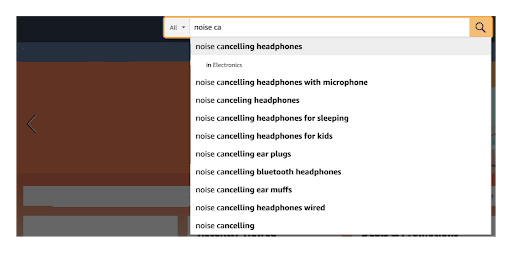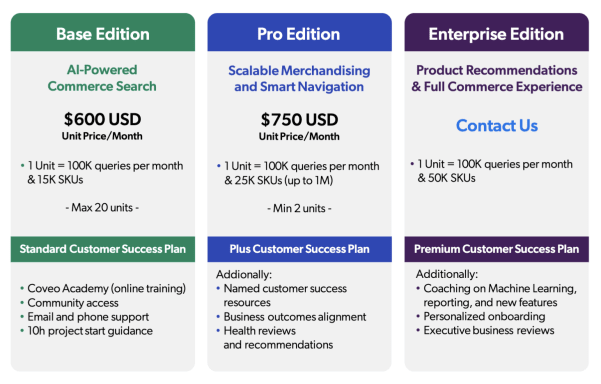A company can’t ever just set and forget pricing.
And at Coveo, we treat pricing like we treat our product, meaning that we are constantly researching ways to make it more customer-friendly and scalable to requirements.
It’s always rewarding to hear from our customers about how our Ecommerce solution helps them not only to achieve but also to exceed their business goals in a number of ways. So we’re pleased to announce that Coveo has introduced a new pricing model to provide Ecommerce technology buyers with an even more simplified and seamless buying experience.

One of the secrets to building long-term relationships with clients is putting their business needs at the center of our pricing model. We asked current customers which model would provide both the flexibility and simplicity that they craved. The short answer is a model that directly links the price paid to the value received – without a direct revenue-share model.
How Coveo’s Pricing Maps to Delivered Value
Buyers are increasingly asking for pricing models tied to consumption. However, picking the right metric to define ‘consumption’ is critical. While there are several metrics available, a good metric should clearly map to the delivered value.
Here is where most vendors in our space seem to get it wrong. Whereas many tie consumption to search operations triggered at every keystroke or to web traffic, we took a different approach.

It made much more sense for us to focus on a metric closely tied to the number of search activities their customers perform – rather than the website’s traffic itself. After all, we’re in the business of helping companies increase conversion rates and average order value by helping them deliver the most relevant search experiences to their customers.
Queries Per Month Methodology
We operate using a “queries per month” (QPM) methodology. As the name suggests, at its core lies the concept of query. That being said, we have developed a characterization of “query” that is flexible enough to accommodate the complexity and heterogeneity of Ecommerce customer journeys as well as the multiplicity of search and discovery touchpoints we impact and power.

For us, “query” refers to any request sent to the search API and includes specific, user-driven operations, such as submitting a search request, interacting with search facets, requesting subsequent results pages, and sorting search results. For a detailed description of what counts and doesn’t count as a query, refer to our technical documentation.
Don’t Pay for Type Aheads
We all understand type-ahead (autocomplete, query suggest, or autosuggest) search. With each keystroke, the system searches for – and filters – results. This might shock you, but some vendors are actually charging by the keystroke, as it is passing a request back to their server.
With Coveo, the list is actually generated by machine learning – these types of searches don’t hit the index. Thus, the rendering of query suggestions while typing will not count as queries. It’s only when a person selects from a rendered query that it will count.
For example, let’s say a person is searching for some noise-canceling headphones. As that individual is typing, a number of relevant suggestions are shown. In the image below you can see the drop-down of suggestions after the letters n-o-i-s-e (space) c-a have been typed.
With some vendors that string would actually count as 8 queries.
Instead, with Coveo, only selecting a rendered query suggestion (e.g., “noise-canceling headphones”) would count as a query.

NOTE: Some vendors treat each individual keystroke as a distinct query. We do not. With Coveo, a query does not count until you complete it and hit the search button.
A lone exception to this query determination arises when organizations want a preview of assets (such as product images) and prefer to have queries come up with each keystroke. In this case, this will count as a query – to support the specific business decision.
So when comparing the prices for bundles of queries coming from different vendors, it’s always important to ensure one is not comparing apples with oranges.
If you are currently using a search-as-you-type payment model, which charges by the keystroke, a switch to Coveo should realize a nearly 6x savings. On average, each of Coveo’s queries corresponds to 5.8 individual keystrokes.
This is a non-trivial difference. For example, that would mean that an Ecommerce site that requires 100,000 QPMs on Coveo’s model could be charged for 580,000 queries per month based on a different vendor’s pricing model. It is therefore highly important to keep in mind that not all queries are created equal.
Why Our Definition of Query Is More Business-Tuned
It is also key to highlight, however, that there are a number of reasons why our definition of query is more in line with business needs than others.

First, technology buyers demand a simplified buying experience, and treating each individual keystroke as a distinct query just adds layers of complexity and friction. Most buyers actually have very limited insight into what this number would actually be or mean.
Second, what customers really care about is what value your product offers them, and pricing models based on the number of API calls that treat each keystroke as a distinct query end up disconnecting value from the product. Simply put, why would they care about the number of keystrokes at all?
Third, vendors charging for each keystroke actually penalize companies who are trying to catch up with digital leaders in terms of customer experience. You can see this as a tax on success and innovation.
Today’s digital consumers expect the Google experience on every site: type in what you’re looking for, using your own words to describe something that can be described in a million different ways, and presto – and find exactly that. Given the state of things, it’s no surprise that your customers are getting more used to searching using full sentences rather than keywords.
They may be looking for “Women’s red shoes available in size 7.5” or “extreme weather sleeping bag.” Companies charging per keystroke end up punishing you for the complexity of your customers’ searches. At Coveo, instead, we empower digital leaders by handling their customers’ increasingly complex search needs and queries.
Coveo’s Scalable and Flexible Packaging
More importantly, Coveo’s new pricing comes with brand new packaging as well.
We have looked at the best way to assemble features, functionality, and services into different plans to be a key ally to a company’s growth.
Our new pricing now allows organizations of all sizes to benefit from AI-powered relevance, from those who just need more basic functionalities to those who are ready to use it all.
This new tiered approach encompassing a Base, Pro, and Enterprise plan aligns with the customer’s complexity, requirements, and technology needs. A maximum number of SKUs is attached to each plan in order to guide prospective buyers towards the most appropriate option.
While tiered good/better/best packaging is by no means news in the SaaS world, our new packaging is unique in important ways relative to the standard packages of other vendors.
In particular, our entry-level Base plan includes all the functionality necessary to get started without compromising on a market-leading AI-powered search experience. This allows customers to start at an affordable price while getting access to critical features, functionalities and capabilities such as Coveo Machine Learning, personalization as you go, and detailed analytics and attribution dashboards.
Most vendors choose to offer AI and personalization capabilities only with their most expensive plans. From our point of view, this approach positions some features and functionalities as ‘nice to haves’ when they really are ‘must-have’ – regardless of the size of your company. AI is now table stakes for businesses to meet customer expectations and thrive, which is why we made that available from our basic plan. You simply can’t have relevance without AI and personalization. And we won’t compromise on that.
Dig Deeper
Want to dive into the details? Explore our Ecommerce pricing overview.
And be sure to check out our overall pricing approach too.




